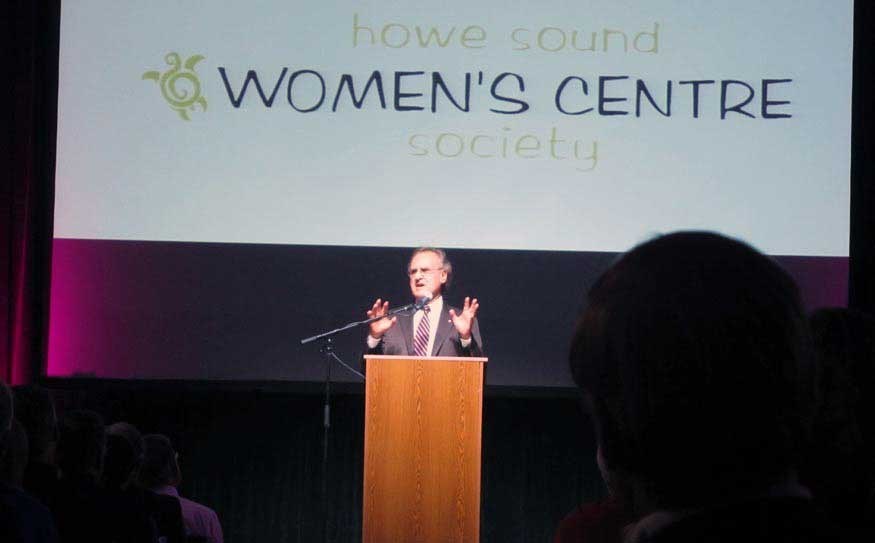Howe Sound Women's Centre has lost "a considerable amount of money" following its 30th anniversary gala with keynote speaker, diplomat and Canadian social justice activist Stephen Lewis.
Lewis gave the keynote address at the April 14 event — called Women. Influence. Our World — at the West Coast Railway Heritage Park in Squamish. He spoke alongside Pivot Legal Society lawyer Katrina Pacey, who talked about the recent fight at the Supreme Court in Ottawa for legal rights for Canadian sex workers, a fight that started in Vancouver's Downtown Eastside, and Mina Dickinson, a former member of the board at the Howe Sound Women's Centre (HSWC), who told her dramatic and engaging story of being a young widow smuggled out of Iran in the 1980s for a new life in Canada.
Some in the audience came from as far away as New Westminster and the Fraser Valley to hear Lewis, a former United Nations ambassador, talk of his support for HIV/AIDS projects in Africa through the Stephen Lewis Foundation, and his work in the fight to end violence against women around the world.
Gala organizer Tessa McLoughlin said 400 tickets out of a possible 900 had been sold. It was the biggest event HSWC had ever hosted.
"I'm definitely a bit depressed, but if I weigh in the impact it was very successful," she said. "I really wanted to do exactly what we did. We wanted people to come out of it knowing about us, and they do. The response has been unbelievable."
Costs to run the event were high, with Lewis's fee, which went to his foundation, being $20,000. Sound proofing the roundhouse and the sound system for the event cost a further $10,000, approximately.
The women's centre had hoped to use any profit to increase the region's programs for children; currently 25 youngsters are on a waiting list to take part in their counselling program for children who witness abuse in the home. The centre also supports 3,500 to 4,000 visits per year from women in the Sea to Sky corridor at its centres in Squamish and Whistler, a safe house in Squamish, and many other projects.
It was too early to assess fully how they would try to recoup the loss, McLoughlin said, though she said she would like to host similar large-scale events on a yearly basis, using what they learned from the gala.
Lewis spoke of the most serious of subjects: HIV and AIDS, domestic violence, rape, and the sex trade and human trafficking of women and children. An electrifying speaker and storyteller, the audience at the gala was completely silent as Lewis described conditions in Africa, where he has been working for 40 years, and in Calcutta, which he had just visited, having been part of a mission of activists to interview young sex workers and their families.
With horrific tales of how violence and rape against women always accompany war, Lewis spoke of the 500,000 female rape survivors in the Congo, and told of the hospital and doctors his foundation has funded there to help some of them recover. His anger was palpable when he spoke of the lack of action on the part of governments and international bodies like the UN Security Council when it came to capturing and prosecuting those who attack women and girls on such a massive scale.
"When it is a matter of gender, there is always this deep, abiding resistance to intervene," Lewis said.
As he spoke, dozens of members of the audience held up smartphone cameras to capture the moment digitally, and Lewis drew applause as he praised the HSWC.
"I applaud the women's centre because there always has to be a vibrant, progressive force in the community," Lewis said. "It does my heart good to see people coming out and supporting these issues in small communities. I salute you for it."
• New research from British Columbia's Coroners Service found that murdered women are eight times more likely than men to be killed by their spouse or romantic partner. The study, which looked at domestic violence in B.C. from 2003 to 2011, found that the 120 victims made up one-eighth of homicide victims in the period, and that victims of aboriginal ancestry were over-represented in the numbers.




